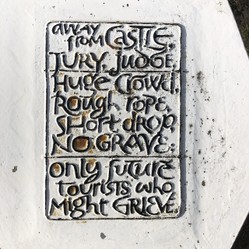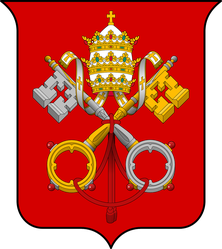"It's not about being good, it's about accepting Jesus Christ as your personal saviour" declared a student of mine who belonged to an evangelical fellowship. She was voicing a view that there is a belief requirement for heaven. As evangelicals believe only in heaven and hell, by implication she believed that non-Christians fry in Hell. She is not alone in this commonly held belief. But it is not belief universally held by Christians. The Catholic Church has for a long time thought about non-Christians who live righteously. Without Christian faith can they go to heaven? But must not a just and good God recognize their virtues?
Catholics came up with the doctrine of limbo. Convinced that baptism and faith in Christ were necessary for salvation, they were reluctant to condemn good-living non-believers to Hell, so an intermediate state for virtuous non-Christians was postulated. Some thinkers regarded limbo as a less miserable version of Hell, but later thinkers regarded it as a lesser version of heaven.
However, more recently Pope Francis reminded us that heaven is a gift of God. As Christians who have accepted Christ we have already accepted God's offer, but this does not exclude God's being able to extend his gift to virtuous non-Christians. Our view of the afterlife must do justice to the goodness of God and to the freedom that he has given humans. God's goodness implies that he offers eternal life to all, but humans are free to accept or reject his love.
Now here comes the reason for my disagreeing with my student. Yes, she and I both accept Jesus as our personal saviour, but I do not confine acceptance of Christ to acceptance of a specific formula. There is a distinction between acceptance of a conceptual formula, a set of words, and acceptance of a person. Verbal formulae are aids to accepting a person, but alone they are not enough. It is possible to have expert knowledge of theology and world religions, but have no personal acceptance of God. Deep academic knowledge can sadly be combined with a shallow prayer life. We need to accept the person of God. This means turning mind and heart to him.
As we are saved by turning heart and mind to God there is no place in Catholicism for reliance on sacred rituals and places. While Catholicism is rich in ritual and sacred sites, they are aids to religious life and are pointless unless they aid the proper direction of heart and mind to God.
I have addressed this fundamental question through the lens of my Catholic faith. I cannot do otherwise, for there are no neutral standpoints in religion or philosophy. Readers may disagree from their own standpoints. Feel free to do so. I hope for vigorous discussion.






 Pilgrimage. A reviewon 06/15/2025
Pilgrimage. A reviewon 06/15/2025
 Leo the Fourteenthon 05/09/2025
Leo the Fourteenthon 05/09/2025
 The Melsonby Hoardon 03/25/2025
The Melsonby Hoardon 03/25/2025




Comments
I have never heard of any connection between Kipling the bakers and Rudyard. No connection is advertised
Thank you for your comment below in answer to my previous observation and question.
Online sources correlate French fancies with desserts configured by the Mr. Kipling corporation from 1967 onward.
Might the Kipling corporation by monikered as such as founded or staffed by descendants or relatives of Rudyard Kipling?
They were routine cream and jam.
Thank you for your comment below on Jan. 24, 2024, in answer to my previous question Jan. 23, 2024.
Online sources generally approach French fancies as sponge cake covered with buttercream and icing. Perhaps they describe quite sweet Unitedstatesian equivalents.
Possibly Unitedstatesians fill edibles with rich creams rather than nutritious jams.
Might you recall what cream and what jam so charmingly, so understandably mattered -- ;-D -- to Maureen's mother?
French fancies are very sweet and have jam and cream. They provided a light source of sugar for an old lady.
Today I caught up with comments other than my own ;-D in the comment boxes below.
Your comment from May 31, 2021, got my attention. You mention Maureen's mother preferring cakes called French fancies.
What might a French fancy be, look, smell and taste like?
Weighing good anď bad deeds is a Jewish rather than a Christian idea. Christians believe that you can be saved up to the moment of death.
The second question at the end of the next-to-last paragraph under the first subheading, Facing the gallows, asks, "Does God weigh your good and bad deeds in the scales?"
The aforementioned question causes me to think of Genesis 18:16-33, where Abraham perhaps defends the possible few good people in Gomorrah and Sodom.
Abraham goes from saving the above two cities for 50, then 45, then 30, then 20, then 10 good people.
Is it known why Abraham stopped at 10?
Is there some tradition of 10 commissions or omissions as the tolerable limit of bad deeds, feelings and thoughts?
I presume so, but we don't have much information to go on.
The fourth paragraph to the second subheading, An evil life, considers that "This is a temporary state undergone by people who have repented their sins, but have either payment to make and/or spiritual development to do before they are ready for heaven."
Does the person in purgatory know on her/his own what to do or is there a spiritual guide such as a guardian angel there to help?